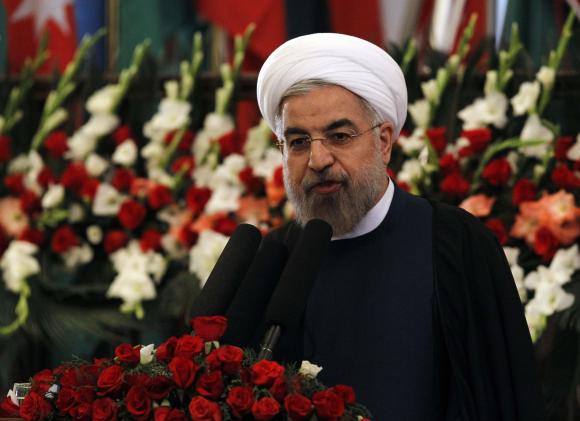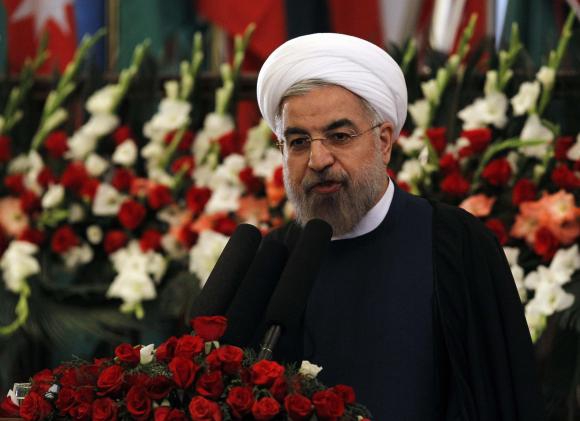 (Reuters) - A sharp drop in the rial currency reveals heavy pressure on Iran's�economy�as President Hassan Rouhani struggles to deliver higher living standards and shore up domestic political support for a nuclear deal with world powers.
(Reuters) - A sharp drop in the rial currency reveals heavy pressure on Iran's�economy�as President Hassan Rouhani struggles to deliver higher living standards and shore up domestic political support for a nuclear deal with world powers.The rial's free market rate against the U.S. dollar sank to 33,000 this week, a fall of 9 percent from around 30,000 in early April, according to Iranian currency trading websites. Central bank governor Valiollah Seif issued a rare public statement trying to calm the market.
"The currency's fluctuation in recent days is not in line with positive signs regarding theeconomy," Iranian media quoted him as saying last week. He blamed "opinions that aren't based on correct information", without elaborating.
Iran�and six major world powers plan in mid-May to start drafting key elements of a broad settlement to the dispute over the country's nuclear program, with the hope of putting an end to a decade of tensions.
The six want to ensure the program is curtailed enough that it would take�Iran�a long time to assemble nuclear bomb components, if it chose to do so. The Islamic Republic denies having such intentions but wants to end the tough economic sanctions that have hurt the economy.
The recent rial slide has not been as serious as in 2012, when the currency lost a third of its value to nearly 40,000 after the latest round of sanctions were imposed.
Since he took office last August after a landslide election win, Rouhani has succeeded in repairing some of the economic damage which Iran suffered during years of direct confrontation with the West under his predecessor Mahmoud Ahmadinejad.
The official inflation rate has come down to 32.5 percent from above 40 percent in mid-2013. The economy seems to be emerging from recession; gross domestic product will grow 1.5 percent this year after shrinking 5.6 percent in 2012 and 1.7 percent in 2013, the International Monetary Fund estimates.
But the rial's renewed weakness suggests those gains remain vulnerable and that Rouhani faces major political and financial pressures as he tries to reform economic policy and cut the influence of some of his conservative enemies over the economy.
Reasons for the rial's drop remain murky, but none are positive for Rouhani, whose success in stabilizing the currency was one of his key early achievements after the election.
Some traders and businessmen in Tehran and Dubai speculate that Iran, its oil�earningsslashed by Western sanctions, may have run up against a fresh shortage of foreign currency.
There is also talk that wealthy Iranian businessmen opposed to Rouhani's reforms deliberately dumped rials, to warn him not to go too far. Others believe ordinary Iranians scrambled to buy dollars because they feared an imminent rise in gasoline prices, the result of his subsidy reforms, would boost inflation again.
Thousands of foreign businessmen are exploring the possibility of returning to Iran if Tehran reaches an international agreement on its nuclear program by a July 20 deadline. But the economic uncertainties mean many may return only slowly and cautiously, even if a deal is struck.
"Slowly but surely, the economy is recovering. But overall it is going to take time," said Ramin Rabii, director of Turquoise Partners, a Tehran-based investment firm which has around $200 million of assets under management.
"There is still stagflation, high inflation with very low growth. This is not something one can escape from in a short period of time - it would not be easy anywhere in the world."
POLICIES
Iran's supreme leader Ayatollah Ali Khamenei, who oversees Rouhani, has spoken repeatedly this year of creating a "resistance economy" to mobilize the nation's resources against foreign pressure.
Far from indicating a lurch towards more state control of the economy, the rhetoric seems designed to placate hardline conservatives while justifying Rouhani's reforms, which in many ways resemble policies of a center-right European government.
Tighter fiscal and monetary policy are at the top of the list. Growth in projected budget spending for the current fiscal year was slowed to 9 percent, well under inflation, in contrast to profligate spending under Ahmadinejad.
Seif, appointed by Rouhani, has begun to rein in the ballooning money supply growth which fuelled inflation and rial depreciation. This could eventually permit a cut in the double-digit interest rates hurting Iranian firms' competitiveness.
Officials have spoken in principle of giving the private sector more of a role in the economy; in a sign of possible reforms to come, exports of�steel�products were liberalized between January and June 2014 to give producers an incentive.
Rouhani appointed Mohammad Nahavandian, a former head of the Iran Chamber of Commerce, as his chief of staff. This has raised hopes for pro-business changes to labor rules and a cut in red tape which adds months to the process of establishing firms.
The president has also taken aim at some of the powerful�business�interests, some linked to the Revolutionary Guards, who prospered under Ahmadinejad because of preferred access to state deals and hard currency rationed at cheap official prices.
A number of existing government contracts with the Guards have been challenged by ministers, and officials have said they will move this year towards narrowing the gap between the rial's free market and official rates, reducing a key avenue for corruption. Such policies could make the economy more competitive and efficient.
Rabii said that once sanctions were lifted, there would be a major and immediate industrial boom in Iran as companies which were operating far below capacity, having been starved of imported parts and materials, became able to obtain them.
"This is the low-hanging fruit for growth when sanctions are eased," he said.
OBSTACLES
The rial's slide, however, suggests that fruit further up the tree may be hard to pick. For one thing, Rouhani is finding it more difficult than hoped to rationalize government spending and divert it into more productive uses.
Last week's subsidy reform boosted gasoline prices in Iran by up to 75 percent but it was smaller than initially expected - some officials had previously talked of doubling prices - which suggested concern about the negative impact on inflation.
In any case, the government is having to spend billions of dollars on cash handouts to citizens in order to soften the social impact of the reform.
"The government is finding that achieving the hoped-for cost savings is difficult," said Suzanne Maloney, a senior fellow at the Saban Center for Middle East Policy in Washington, and a former U.S. State Department policy advisor. "The benefits of some policies are eroded or absorbed by others."
The pressures on Rouhani can also be seen in authorities' handling of a mini-stock market crash this year. After soaring 132 percent last year, partly because of optimism about a Rouhani presidency, the Tehran Stock Exchange index sank 16 percent between the start of 2014 and mid-April.
In most countries, such a pull-back would be considered nothing more than a healthy correction after a huge rise. But in Iran it is politically sensitive and in mid-April several Iranian�banks�and insurers, some state-owned, banded together with authorities' support to pledge as much as $2 billion to a market stabilization fund.
Stocks�have now stopped falling, but the Rouhani administration's free-market credentials look a little less convincing.
Meanwhile, Rouhani's efforts to open the economy to more competition and transparency have run into strong resistance from interests which might be hurt by them, said Iranian-born economist Mehrdad Emadi of the Betamatrix consultancy in London.
One sign of that resistance came in early April when Rasoul Sanai-Rad, head of the political office of the Revolutionary Guards, publicly praised the Guards' involvement in industries such as construction and oil, saying it had helped Iran to resist the Western sanctions.
While moving the economy into more efficient management is an important part of Rouhani's reforms, so far "the translation into action has been very small and slow," said Emadi.
By Reuters
The Iran Project is not responsible for the content of quoted articles.











